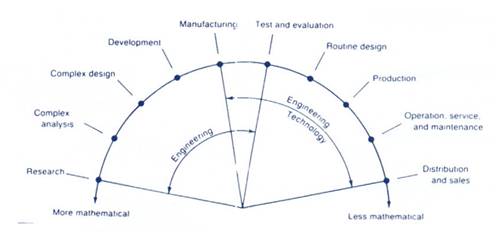A common question we get is about the differences between mechanical engineering (ME) and mechanical engineering technology (MET)? The table below shows a side-by-side comparison of the key aspects of each program.
| General Overview | ME Program | MET Program |
| Program Emphasis | Emphasis is on developing methods of analysis and solutions for open-ended design problems. | Emphasis is on applying current knowledge and practices to the solution of specific technical problems. |
| Expertise Objective | To develop conceptual abilities. | To develop application abilities. |
| Program Characteristics | ME Program | MET Program |
| Emphasis of Technical Courses | Engineering courses stress the underlying theory as well as current and potential applications in business and industry. | Technology courses stress application of current technical knowledge and methods in the solution of current business and industrial problems. |
| Emphasis of Laboratory Courses | Laboratory courses provide intensive work in experimental methods and the related underlying theories. | Laboratory courses stress practical design solutions as well as manufacturing and evaluation techniques appropriate for industrial type problems. |
| Technical Design Emphasis | General design principles and tools applicable to a wide variety of new problem situations are heavily stressed. | Current design procedures of a complex but well-established nature are developed and applied to problems in a specialized technical area. |
| Career Opportunities | ME Program | MET Program |
| Typical First Position | The ME graduate entering industry would most likely fill an entry-level position in conceptual design, systems engineering, manufacturing, or product research and development. | The MET graduate entering industry would most likely fill an entry-level position in product design, development, testing, technical operations (manufacturing), or technical services and sales. |
| Technical Interest | The ME graduate is relatively broad and has an analytical, creative mind challenged by open-ended technical problems. | The MET graduate is often specialized and has an applications orientation, challenged by specific technical problems. |
| Mobility | Many MEs move into management positions. | METs can move into industrial supervisory positions. |
Different Career Paths…
There are differences in professional opportunities typically open to MEs and METs, but realize that there are no hard and fast rules that prevent MEs or METs from entering any specific career path. This may be employer specific, but certain career paths are more common than others. Example: working in manufacturing is a predominant career area for METs, but is one of many common options for MEs.
What does all this mean?…
Both degree programs are viable in the marketplace. Both are hands-on. The real educational difference lies in the ME program requiring a deeper understanding from students of the “why” of systems engineering as opposed to just the “how” of observing and quantifying system parameters. METs are well versed in how a system works and can build systems from existing components and processes to solve problems. This may be called design. However, the ME graduate is qualified to create/invent brand new components, systems, products, and processes that have not previously existed. This is design synthesis and it encompasses the ability to apply analysis to new situations and solve previously unsolved problems. Not all MEs do this type of work, but they have that capability from their educational program. Within the curriculum, for students, this may effectively mean that the ME program requires more theoretical/mathematical work and derivation of the tools (equations) that govern engineering principles. The MET student will just be taught to use these tools to solve issues that may arise within their organizations, without emphasis on where the tools come from and why they work.
Source: The American Society of Mechanical Engineers brochure, October 2000.
